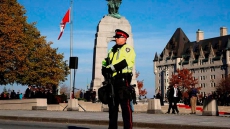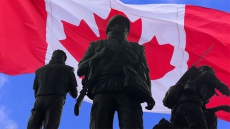TORONTO — A disciplinary hearing for the most senior police officer charged in relation with mass arrests made during Toronto's G20 summit, which was put on hold last week after the presiding judge fell ill, will resume on Dec. 1.
Retired Ontario Superior court judge Peter Grossi had to leave his role on Friday due to medical reasons.
Another retired Ontario Superior Court judge, John Hamilton, is now presiding over the police hearing for Supt. Dave (Mark) Fenton.
Lawyers involved in the case say Hamilton has agreed to consider the evidence and testimony that was brought before Grossi last week, which means the hearing can pick up where it left off.
Fenton has pleaded not guilty to a total of five charges of unlawful arrest and discreditable conduct stemming from two "kettling'' incidents that occurred over the G20 summit weekend.
The first took place on Saturday, June 26, 2010, hours after a small group of vandals smashed windows and set police cruisers alight.
Fenton ordered officers to box in protesters in front of a downtown hotel. More than 260 people were arrested and taken to a makeshift prisoner processing centre, which came under severe criticism for its deplorable conditions.
The second incident occurred the next day when, six minutes after coming on shift, Fenton ordered police to keep scores of people standing for hours at a downtown intersection despite a severe thunderstorm that left them drenched.
Lawyers for some complainants who were caught up in the mass detentions have told the hearing that Fenton's actions were overly broad and led to the violation of people's civil rights.
Prosecution lawyers have said the hearing needs to determine whether the arrests ordered by Fenton were "lawful and necessary" and whether they constituted conduct that would lower the esteem of the Toronto Police Service in the eyes of the public.
Meanwhile, Fenton's defence lawyer has said the hearing is only dealing with two issues — whether Fenton had grounds to issue his arrest orders, and whether he failed to monitor the processing and detention of those who had been arrested.
More than 1,000 people were detained over the summit weekend in what is considered the largest mass arrest in Canada's peacetime history. Most were released without charge.





